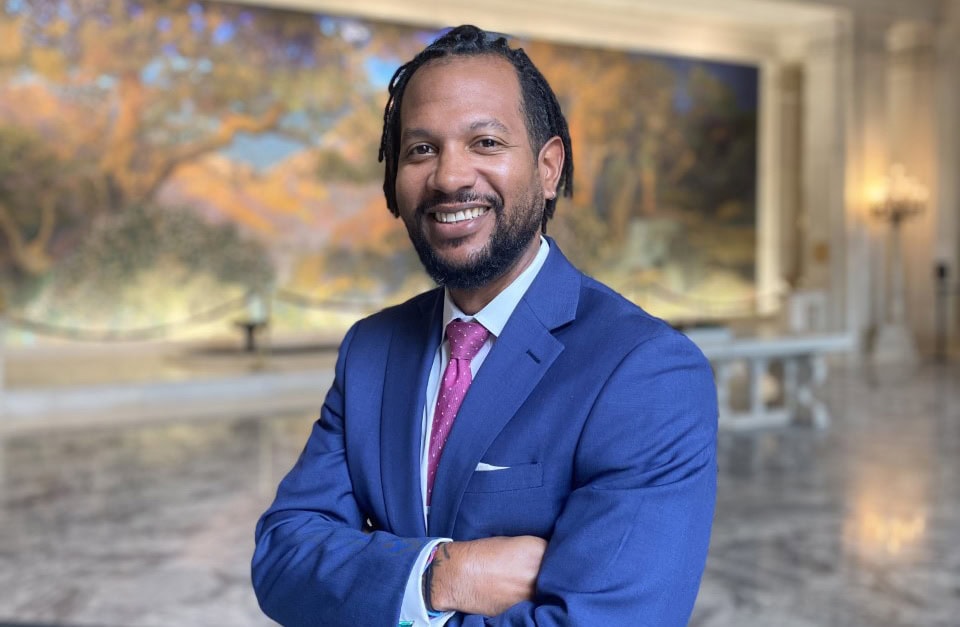A Prosecutor Promotes Compassion

In Philadelphia, Adam Geer ’99 aims to build common trust in public safety
—Nancy Shohet West
Recently appointed Philadelphia’s first chief public safety director, Adam Geer ’99 now faces the challenge of restoring public confidence in local law enforcement. It’s a charge he’s undertaking guided by values he embraced as a student at Concord Academy.
Geer still remembers his first impressions of CA when he arrived on campus in the mid-1990s. “What really pulled me in was the kindness,” he says. “I sensed an openness to thought, to ideas, to people. Even at 14, I knew how important that was to me.”
Among the first things Geer noticed while touring CA was schoolwide support of the LGBTQ+ community. Although it isn’t one with which he personally identifies, the culture of inclusivity resonated with the young African American teen from upstate New York. “Knowing you are in that environment makes you feel safer in a lot of other areas too,” he says.
Though the mostly white student body was not without its inherent biases, Geer found in CA a place for self-expression. “I sported an Afro and wore a dashiki,” he says. “At the same time, I had friends with indoor pools in their homes. Sharing cultural and racial differences prepared me for a future navigating a professional realm that is mostly non-POC [people of color], and those skills have allowed me to advance in my career more easily and successfully.”
At Temple University Beasley School of Law, many of his classmates were laser-focused on large corporate law firms and the salaries they offer, but Geer says his exposure to equity and fairness at CA engendered in him a wish to serve the public, and he went to work for the district attorney’s office. He became Philadelphia’s assistant district attorney, then the deputy inspector general for public safety.
“CA’s adherence to common trust policies formed my perspective on justice,” he says. “One reason I had a successful career as a prosecutor was that defendants, defense attorneys, judges, juries—they could all sense my genuine compassion and my respect for the process. Whether defendants were found guilty or acquitted, they felt they had been treated fairly.” Having occasionally broken the rules back at CA, Geer says he knew firsthand that an approach focused on empathy rather than blame could make an enormous difference in someone’s self-perception and future behavior.
As Philadelphia’s chief public safety director, Geer is charged with improving the city’s response to crime by coordinating agencies and resources, including police, firefighters, prisons, and emergency services, with a mission to improve public trust in the way local law enforcement carries out its work. Underlying these efforts is the quest to address the racial divisions with which many cities have struggled, especially in the wake of the Black Lives Matter movement.
“People in places like Philadelphia have a fraught relationship with law enforcement,” Geer says. “A lot of repair work needs to be done between police and the communities they serve. And there are many ways we are trying to build that trust. We need to have police forces that reflect the population with which they work. We need to do a better job of recruiting and removing barriers to people of color for careers in law enforcement. Police departments need to be empowered to see themselves as guardians as opposed to warriors.”
Along with intangible tasks such as building trust and promoting compassion, material changes need to be made as well, Geer says. He cites an example from earlier in his career, when he was deputy inspector of public safety and a constituent told him about a grandmother who had to clean her own grandson’s blood off the sidewalk after a shooting took place. Geer pursued the issue, and as a result, he says, “Philadelphia is the first major city in the country to publicly fund the cleaning of crime scenes in public spaces.”
That’s a matter of compassion, but it also influences how a rising generation of young people experience city life. “Children walking to school will no longer be subject to the trauma of stepping over pools of blood,” he says. “The fact that I was a part of this one small change brings me incredible joy.”
Looking ahead to what he hopes to accomplish in his current role, Geer sees three major benchmarks for success: “I would like young men and women of color to feel that they have been instilled with coping skills or tools for the trauma they are experiencing. From a policy standpoint, we need successful advocacy to implement sensible gun legislation. Finally, we need more recreational opportunities and workforce development programs for our young people. We can’t police our way out of the problems faced by cities like Philadelphia. But strategies like this will help us get closer to where we need to be.”


